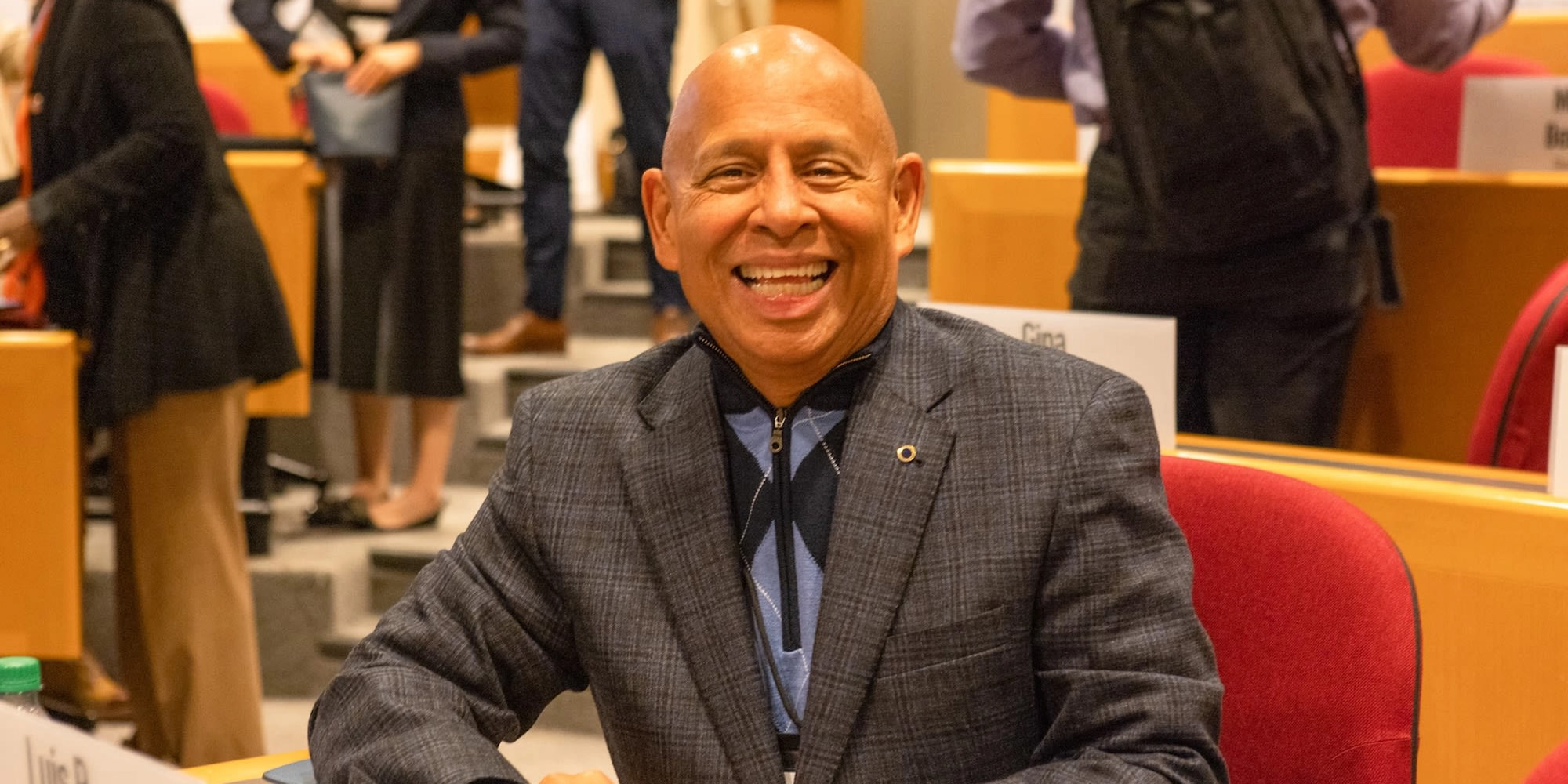



Close
result
REFLECTION
Elevating Leadership: principles for principal and chief of staff alignment
Elevating Leadership: principles for principal and chief of staff alignment
Luis R. Visot, Ed.D.
8 min read

With a unique perspective as a three-time certified Chief of Staff through The Chief of Staff Association and a Principal, Luis R. Visot, Ed.D., brings a wealth of experience and knowledge. His professional journey includes serving as a Chief of Staff in the U.S. Army and the University of South Florida, and as a principal in the U.S. Army, where he worked with five chiefs of staff.
At the Chief of Staff Association’s Global Chief of Staff Dialogue (COS24), I witnessed a transformative relationship between Jeff Buckeye, Chief of Staff, Office of the Microsoft Americas President, and his Principal, Deb Cupp, President, Microsoft Americas. Their professional bond, guided by a concise set of core principles and values, was not just a relationship, but a journey. This inspiring realisation led me to challenge the chiefs of staff present to commit, in writing, to define and articulate the core principles and values that guide their relationship.
Why is this important? It offers mutual benefits to both parties, including a growth mindset, effective communication, trust, and a team focus so that the organisation's culture, strategies, and team members can thrive in an ever-changing operational environment. In summary, when the principal and the chief of staff are aligned and operating at optimum levels, they will be able to help the entire organisation power forward successfully.
I outline below some of the fundamental principles that underpin this essential professional relationship. They are not rigid rules, but a flexible framework that aims to facilitate a conversation where you can agree on the beliefs and values that will serve as the North Star for your unique relationship.
Integrity
Integrity
At the core of this relationship is integrity. Both parties must commit to authenticity, sincerity, honesty, and transparency in all their dealings: with each other, and others. This means keeping promises and commitments, being truthful, doing what you say you will do, and upholding the highest ethical and moral standards. Integrity fosters trust, the bedrock of collaboration, cooperation, and mutual respect. It is the cornerstone that upholds all other values, beliefs, and principles – and also encompasses keeping your ego in check or at the door.
Clear and concise communications
Clear and concise communications
The principal and the chief of staff must maintain open channels of communication where ideas, concerns, differences, and feedback can flow freely. This keeps both parties on the same page and focused on the same objectives and is achieved through regular check-ins, clear directives, and active listening. The chief of staff best serves the principal by being a critical thinker who can ascertain the difference between fact and opinion, and clearly articulate such differentiation to the principal. Also, the chief of staff facilitates the communication of data and information, including the delivery of news (good or bad). Lastly, the engagement and communication between the principal and the chief of staff should happen frequently, where there are opportunities for process checks, working through new business challenges in real-time, and assessing the team’s status and the organisation’s state.
Leadership presence
Leadership presence
Presence is a leader's most influential skill. It encompasses how you communicate, how you show up in public, and even how you dress. For a chief of staff, ensuring that your principal is in the right place, at the right time, with the right information, in the right attire, and with the right attitude, is paramount. As a chief of staff, I followed the 7/8 P’s: proper prior planning/preparation prevents piss poor performance. This ongoing engagement and communication will enable the successful leadership presence of the principal.
Part of presence is also possessing cultural intelligence. As an organisational sensor, the chief of staff can understand, appreciate, and acknowledge the organisation’s values, rituals, processes, dynamics, and policies. In essence, the chief of staff intuits the ‘pulse’ of the organisation and, therefore, can assist the leader in maximising their presence.
Mutual respect, fairness, and dignity
Mutual respect, fairness, and dignity
Mutual respect and fairness are the fundamentals of any successful relationship. The principal and the chief of staff must acknowledge and value each other’s experiences, expertise, roles, functions, and contributions. Respect is a powerful tool that empowers both individuals to perform their duties effectively, knowing that their contributions are valued. Along with mutual respect is dignity, which comes with being treated ethically and as a valued organisation member. Understanding each other’s differentiated roles, functions, and responsibilities is critical to fulfilling an effective execution of this exceptional relationship.
Trust and confidentiality
Trust and confidentiality
Trust is built over time and is reciprocal. The principal trusts the chief of staff to handle sensitive information discreetly and responsibly. Similarly, the chief of staff supports the principal’s decisions, judgement, and insights. Maintaining confidentiality is critical to preserving this trust. It is important to note that the principal and the chief of staff can and must have opportunities to debate and deliberate openly (in private) issues and concerns about any aspect of the organisation. But once the principal has made the decision, the deliberations are done, the chief of staff will support and communicate such decisions unequivocally. Further, as a team, the principal and the chief of staff are testing the assumptions upon which decisions may be made, or solutions to problems are based. The last part of the trust-developing process is telling the truth. Remember that ‘unpleasant news’ does not get better with time.
Alignment and advancement of vision and goals
Alignment and advancement of vision and goals
Both parties must share a unified vision and work towards common goals. This alignment ensures their efforts are cohesive and channeled towards the organisation's success. Regularly revisiting and realigning these goals helps maintain focus and drive progress. One of the essential duties and responsibilities of the chief of staff is to understand, articulate, explain, and help advance the principal’s vision, goals, and priorities.
Support and empowerment
Support and empowerment
A principal should empower their chief of staff by providing the necessary resources, support, authority, and autonomy to perform their role effectively, and communicate their intent for the chief of staff role to the senior leadership team. In return, the chief of staff must confidently and effectively capitalise on their empowerment to support the principal by managing day-to-day operations, allowing the principal to focus on strategic initiatives and priorities and have freedom of movement within and outside the organisation. This mutual support strengthens the partnership and enhances organisational efficiency and focus, internally and externally. Such reciprocity requires maturity, humility, and mutual reliability, where each individual dares to be vulnerable and open to opportunities for growth and learning.
Accountability and responsibility
Accountability and responsibility
The principal and the chief of staff must be held accountable for their actions and responsible to each other, their immediate team, the organisation, and their supervisors. This means owning up to mistakes, learning from them, and striving for continuous improvement. Accountability ensures that both parties are reliable and can be depended upon to fulfill their roles. This is where the chief of staff and their team require a high degree of self-discipline and discipline. Further, through self-discipline, the chief of staff can carry out their accountability and responsibility functions by practising ‘influence without authority’.
Empathy, compassion, and understanding
Empathy, compassion, and understanding
Empathy plays a significant role in fostering a positive working relationship. Both parties should strive to understand each other’s perspectives, challenges, and pressures. This empathy leads to a more harmonious working environment and can mitigate potential conflicts. Compassion is having a deep sense of understanding, genuine care, and the desire to offer help and assistance. One of Stephen R. Covey’s (1989) habits of highly effective people is ‘seek first to understand, then to be understood’. In the principal-chief of staff relationship, having a high level of sensitivity allows either individual to recognise and acknowledge the physical and emotional state of the other individual and be respectful by providing the ‘space’ for the other person to be at that moment.
Flexibility and adaptability
Flexibility and adaptability
The dynamic nature of organisational leadership requires both the principal and chief of staff to be flexible and adaptable. This means being open to change, pivoting strategies and approaches when necessary, and continuously adjusting to meet the organisation's evolving needs, often in a volatile, uncertain, complex, and ambiguous operating environment. Further, both parties' willingness to compromise is crucial to strengthening the relationship. The chief of staff must have a clear understanding and sense of the organisational culture to advise the principal on sensitive and delicate subjects at any time. One other consideration within the flexibility and adaptability principle is the notion of ‘risk management’. From my perspective, as chiefs of staff, we must be risk-informed rather than risk-averse.
Continuous learning and development
Continuous learning and development
A commitment to continuous learning and professional development is vital. The principal and the chief of staff should participate in opportunities to enhance their skills, abilities, and knowledge. This growth mindset contributes to personal development and the organisation's overall advancement. When the chief of staff and the principal make the time to discuss the learning after their professional experiences, it underscores the value of the developmental experience and how this experience is a positive return on the organisational and principal’s investment. Further, professional and personal development is an example of the organisation's commitment to the value and worth of its members.
Playfulness and fun
Playfulness and fun
Both positions' seriousness, intensity, demands, and requirements are indescribable and tense. Thus, fun – moments of laughter, happiness, and joy – must be part of the relationship and organisational culture.
An effective principal and chief of staff relationship is guided by principles like the ones above to foster trust, respect, and collaboration. By adhering to these principles and others, both parties can work together to drive the organisation toward its goals, implement the principal’s priorities, and ensure long-term organisational success.
A special thanks to my fellow chiefs of staff, Jeff Buckeye, Siobhán Carney, Drew Davis, and Laura Hennesey for your contribution to the content and format of this article. Forever Grateful!
October 2024

Author Bio
Luis R. Visot
Assistant Dean for Administration and Chief of Staff at the University of South Florida College of Education
Luis R. Visot has served in the higher education, nonprofit, and the US Armed Forces sectors, most notably as Executive Director, The Joint Military Leadership Center (JMLC), University of South Florida, while also rising to the rank of Major General (MG) in the US Army. He is currently Assistant Dean and Chief of Staff in the College of Education at The University of South Florida and also a Corporate Director in the United States Army War College Foundation Board of Trustees and the Nonprofit Leadership Center Board of Directors.





